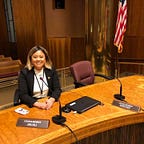Why St. Paul Needs S.A.F.E. Housing Tenant Protections Now
Stable — Accessible — Fair — Equitable Housing
In my first year as a Councilmember supporting my constituents, I’ve had too many tenants reach out to me for basic help keeping a roof over their head. They often worried they needed protection from landlord retaliation; were desperate for help getting basic health and safety repairs done on their unit; had the rent raised on them or their building sold suddenly, and were effectively forced out of their home; or worse. I’ll never forget my constituents who told me they felt like they had to choose between risking their immigration status by asking repeatedly for repairs, or saying nothing and continuing to live in a home with mold and broken foundations. I’ve received panicked phone calls from people who were given a notice to vacate after having friends and family over once and being told they were “too loud”. These and countless other stories illustrate why our city needs comprehensive tenant protections for safe and stable housing.
In the capital city of Minnesota, over 51% of our residents are now renting. This is by far the most diverse group of St. Paulites we have — not just by race and ethnicity, but also by age, length of time to call St. Paul home, family status and more.
Our renter community looks like St. Paul, is the majority of our city, and also increasingly faces challenges to staying here — because of the rising costs of rent, our citywide housing shortage, stagnant wages, and persistent forms of discrimination that have no place in our city. In St. Paul, nearly 70 percent of renter households are cost burdened — that’s more than 40,000 households paying more than they can afford on housing. That’s because even as the economy improves overall, the most in-demand positions in the Twin Cities still don’t pay enough. Even if someone were making $15 an hour and working full time, they would have to pay a third of their income to get a median apartment in St Paul, and almost half of their income to get a 2 bedroom apartment for their family.
In a tight housing market with a suffocating 2% citywide vacancy rate, too many working families and individuals in our city are either priced out or screened out of a place to live. Decades of disinvestment, racially discriminatory housing policy, and exclusionary practices have created a crisis for renters today that demands comprehensive action. The time for tenant protections for St. Paul is now.
For years, community-led tenant rights and fair housing advocates in our community have pushed for comprehensive tenant protections and more support for renter empowerment. In 2017, a City of St. Paul Fair Housing Workgroup convened under Mayor Coleman published a set of recommendations for further action to address these community-led priorities. In 2018, the St. Paul City Council passed a resolution directing staff to study a number of tenant protections and fair housing policies, including advance notice of sale, just cause notice, screening criteria reform, and more. In 2019, our Mayor Melvin Carter echoed these priorities in his State of Our City address, with a call to our Council to bring forth a set of fair housing policies for action. Throughout and preceding all of this, the Anti-Displacement Policy Network was formed with community partners, city staff and elected leaders across Minneapolis and St. Paul to share best practices and create a living partnership that informs and drives this work.
At least 14 different community engagement sessions ranging from in-depth conversations with housing advocates and landlords to community conversations in every Ward in the city led to hundreds of comments and insights into how we could shape an agenda for St. Paul. Our city and community engagement touched a combined 8,000+ rental units and over 23 organizations representing landlords, renters, homeowners and fair housing legal groups.
Now, in 2020, we’ve finally arrived at a set of community-informed proposals that will help secure safe and stable housing for thousands of people across our city, with fair housing at the heart of this work.
Our forthcoming S.A.F.E. Housing Agenda is critical to help ensure that generations of St. Paul residents can continue to call our city home. It’s not only rooted in the best practices that are already utilized by well-intentioned landlords in the community, but extends and enforces those best practices on bad actors who continue to profit while leaving our residents out in the cold.
The best policy is rooted deeply in community with the voices of the most impacted at the center. Without the leadership of a community coalition for change that includes renters, landlords, homeowners and countless everyday residents who’ve made their voices heard, our city wouldn’t be able to bring this agenda forward. I look forward to introducing and carrying this package over the finish line alongside my colleagues on the council and so many community partners who have championed this work for years. Now is the time for tenant protections in St. Paul.
(Graphics and related data according to Minnesota Housing Partnership)
